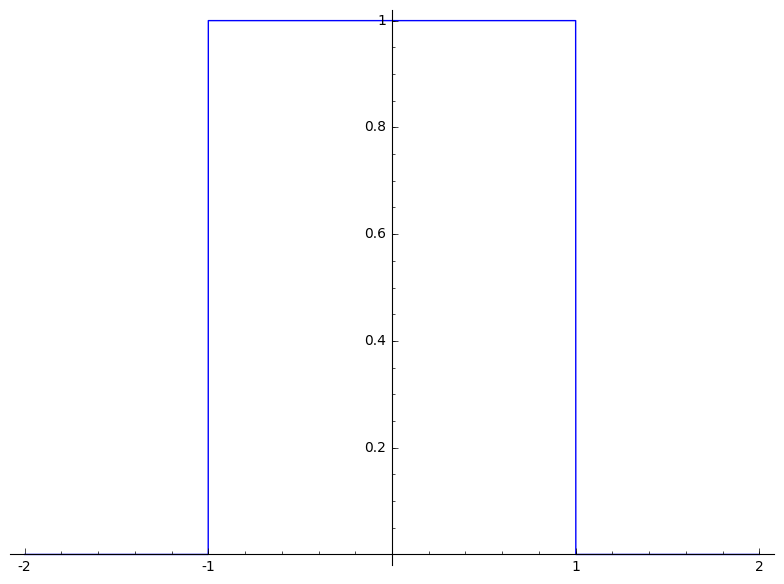Voorbeeld: Vierkante golf in [-2,2]
$\begin{equation}f(x) = \begin{cases} 0 & \text{als }& -2<x<-1 \\ 1 & \text{als }&-1<x<1 \\0 & \text{als } &1<x<2 \end{cases} \end{equation}$
http://doc.sagemath.org/html/en/constructions/calculus.html#fourier-series-of-periodic-functions

|
Bekijk de volgende commando's en gebruik ze om de Fourier-coëfficiënten van $f$ te bepalen :
|
File: /opt/sage/sage-7.4/local/lib/python2.7/site-packages/sage/symbolic/function_factory.py Type: <type ‘instancemethod’> Definition: f.fourier_series_cosine_coefficient(cls, self, parameters, variable, n, L) Docstring:
File: /opt/sage/sage-7.4/local/lib/python2.7/site-packages/sage/symbolic/function_factory.py Type: <type ‘instancemethod’> Definition: f.fourier_series_cosine_coefficient(cls, self, parameters, variable, n, L) Docstring:
|
|
File: /opt/sage/sage-7.4/local/lib/python2.7/site-packages/sage/symbolic/function_factory.py Type: <type ‘instancemethod’> Definition: f.fourier_series_sine_coefficient(cls, self, parameters, variable, n, L) Docstring:
File: /opt/sage/sage-7.4/local/lib/python2.7/site-packages/sage/symbolic/function_factory.py Type: <type ‘instancemethod’> Definition: f.fourier_series_sine_coefficient(cls, self, parameters, variable, n, L) Docstring:
|
|
|
Merk op dat a0= (1/2)*f.fourier_series_cosine_coefficient(0,L)
|
|
|
|
|
|
|
|
Besluit:
$a_n = \begin{cases} 0 & \text{ als } n \text{ even is }\\ \frac{2}{\pi n} & \text{ als } n =1,5,9,... \\ \frac{-2}{\pi n} &\text{ als } n=3,7,11,... \end{cases}$
|
|
|
|
De partiële som $f_N$ van de Fourier-reeks van $f$ bepalen:
|
File: /opt/sage/sage-7.4/local/lib/python2.7/site-packages/sage/symbolic/function_factory.py Type: <type ‘instancemethod’> Definition: f.fourier_series_partial_sum(cls, self, parameters, variable, N, L) Docstring:
File: /opt/sage/sage-7.4/local/lib/python2.7/site-packages/sage/symbolic/function_factory.py Type: <type ‘instancemethod’> Definition: f.fourier_series_partial_sum(cls, self, parameters, variable, N, L) Docstring:
|
|
|

|
De totale kwadratische fout E bepalen:

|
$\displaystyle E=\int_{-2}^2 (f(x)-f_N(x))^2 dx = 4\int_{0}^1 (f(x)-f_N(x))^2 dx=4\int_{0}^1 (1-f_N(x))^2 dx$
|
|

|
|
|
|
|